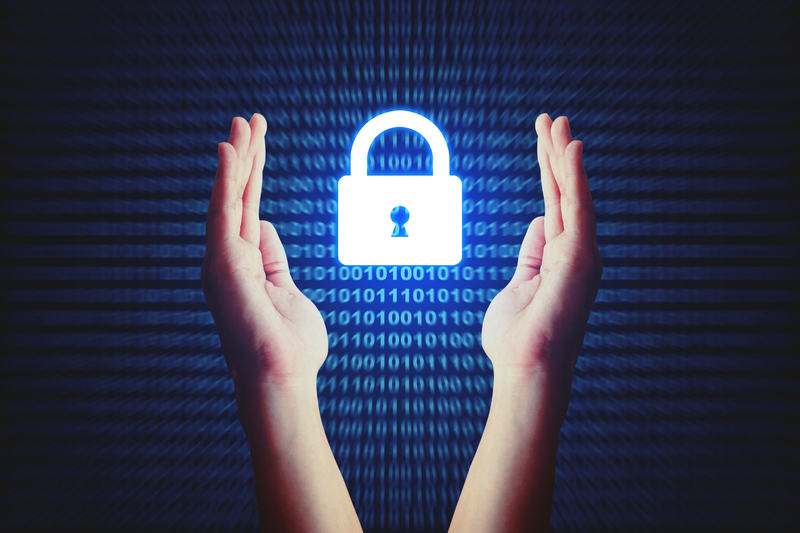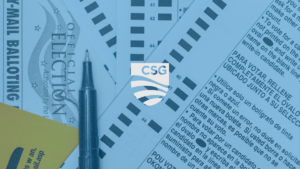
By Nicholas Relich and Casandra Hockenberry
State officials and lawmakers across the US have proposed and passed laws to increase the confidence of voters in election integrity. Challenges faced in the last several elections — such as the COVID-19 pandemic and the spread of misinformation — served as a starting point for some of this legislation.
Post-election audits, known as PEAs, serve as safeguard against errors or fraud and verify of accuracy. Many states have existing statutes authorizing or mandating PEAs in one of two forms: traditional audits or risk-limiting audits. A traditional audit looks at a fixed percentage of voting districts or voting machines and compares the paper record to the results produced by the voting system. A risk-limiting audit is a statistically based audit designed to reduce the risk of a contested race being certified with the wrong winner. If an election margin is wider, fewer ballots must be reviewed; if there is a narrow margin more ballots are reviewed.
For states with existing statutes, the scope (how many ballots) and method (determining precincts, timing, technology and type of audit) may be reconsidered for future elections. In 2022, Louisiana and Maine passed bills mandating audits in the coming elections. Louisiana passed HB 924 (2022) that will require traditional audits, beginning in 2023 after “the procurement and implementation of a new voting system by the secretary of state.” Similar legislation in Maine will pilot a risk-limiting audit after the 2024 election and will allow similar audits statewide beginning the following year.
Election officials must navigate privacy and accuracy concerns in voter registration databases, fight social media misinformation and disinformation, and work to ensure the security of voting infrastructure. States, often in partnership with federal cybersecurity and election agencies —such as the U.S. Department of Defense Federal Voting Assistance Program, U.S. Department of Homeland Security Cybersecurity and Infrastructure Security Agency, and the U.S. Election Assistance Program — have sought numerous solutions to these issues to improve election security and voter’s perception of the trustworthiness in elections in the digital age.
Voter Registration Data
Voter registration data from states, including information on voter names, address and demographic information, have long been available for private use, at various degrees of accessibility, as a means to promote transparency in the election process. However, in an era of increased concern for data privacy, states have adopted different policies regarding the openness of this information. Some states restrict data requests to government agencies and election campaigns, while others maintain open access to the public at large. Many states also charge fees to obtain voter data. States also keep certain information confidential, such as a voter’s social security number, date of birth and driver’s license number, though these policies vary by state. States also restrict information for participants of address confidentiality programs, which protects the confidentiality of victims of certain violent crimes.
Voter registration data is a critical tool for election officials to maintain accurate voter rolls despite changes to an individual voter’s status, such as when a voter moves within the state but into a new election district or across state lines. This in turn helps officials maintain and build public trust in the election process. In May 2023, Washington enacted WA S5459, which requires any requests for voter registration data be processed by the secretary of state, with the goal of increasing public confidence through a more efficient and streamlined process. In the 2023 legislative sessions, Arkansas and South Dakota also provided additional directives for their Secretaries of State to update these records.
Misinformation and Disinformation
Ensuring voters have accurate information on polling locations, procedures, and election issues and have confidence in the election results is a critical goal for states. Social media provides election agencies a means of communicating important resources to voters, but these platforms also provide foreign and domestic bad actors an opportunity to promote confusion and distrust. To counter misinformation and disinformation online, secretaries of state around the nation have taken part in the #TrustedInfo Initiative, a public education campaign led by the National Association of Secretaries of State In 2007, the Election Assistance Commission established the Voluntary Voting System Guidelines, a set of recommendations which set a standard for the agency’s evaluation of voting systems and assists election officials in their own planning. States have either adopted the Election Assistance Commission’s guidelines as their own via statute or created their own testing and certification guidelines. The Commission recently updated this guidance with the VVSG 2.0, which will go into effect on November 16, 2023, after many of this year’s elections. The Election Assistance Commission clarified that the new standards do not invalidate election technologies approved under previous guidelines, but rather reflect updated systems and goals that election officials should consider implementing in the future. At the time of publishing, no election technology vendor has completed the VVSG 2.0 certification processes. State officials recognize the need to mitigate potential confusion in voters through clear communication of implications of the new guidelines.
Several states enacted legislation relating to the cybersecurity of voting infrastructure in 2023. Wyoming and Alabama passed laws requiring electronic voting systems to be incapable of connecting to the internet. States also focused on the use and procedures surrounding paper ballots. Alabama requires the use of paper ballots in electronic vote counting systems through AL S9 (2023). Arkansas required counties cover the cost of paper ballots should they chose to use them over voting machines and ensured that if paper ballots are used, they be compatible with electronic vote tabulation devices selected by the Secretary of State. States have also been interested in the standards and testing of voting infrastructure. South Dakota required that election officials conduct a public test of automatic vote tabulating equipment to ensure accurate vote counting, and Wyoming requires every electronic voting system used in the state include proof of certification by the United States Election Assistance Commission and approval from the Secretary of State.
Summary
Legislation on elections walks a fine line between improving security and ensuring access for all voters. Cybersecurity continues to be an important consideration for state officials motivated to ensure positive voter perception of election integrity. Americans’ confidence in election administration and the legitimacy of election results is a top priority of state officials. This means increased transparency with how elections are administered in the U.S. are necessary.





